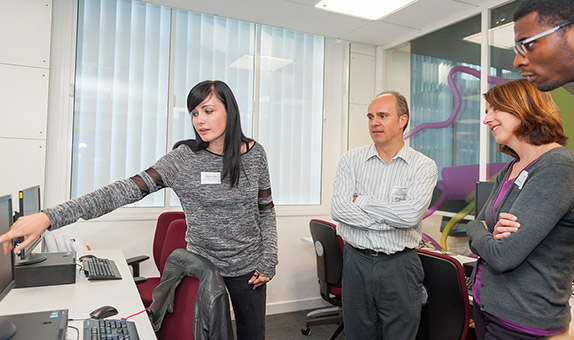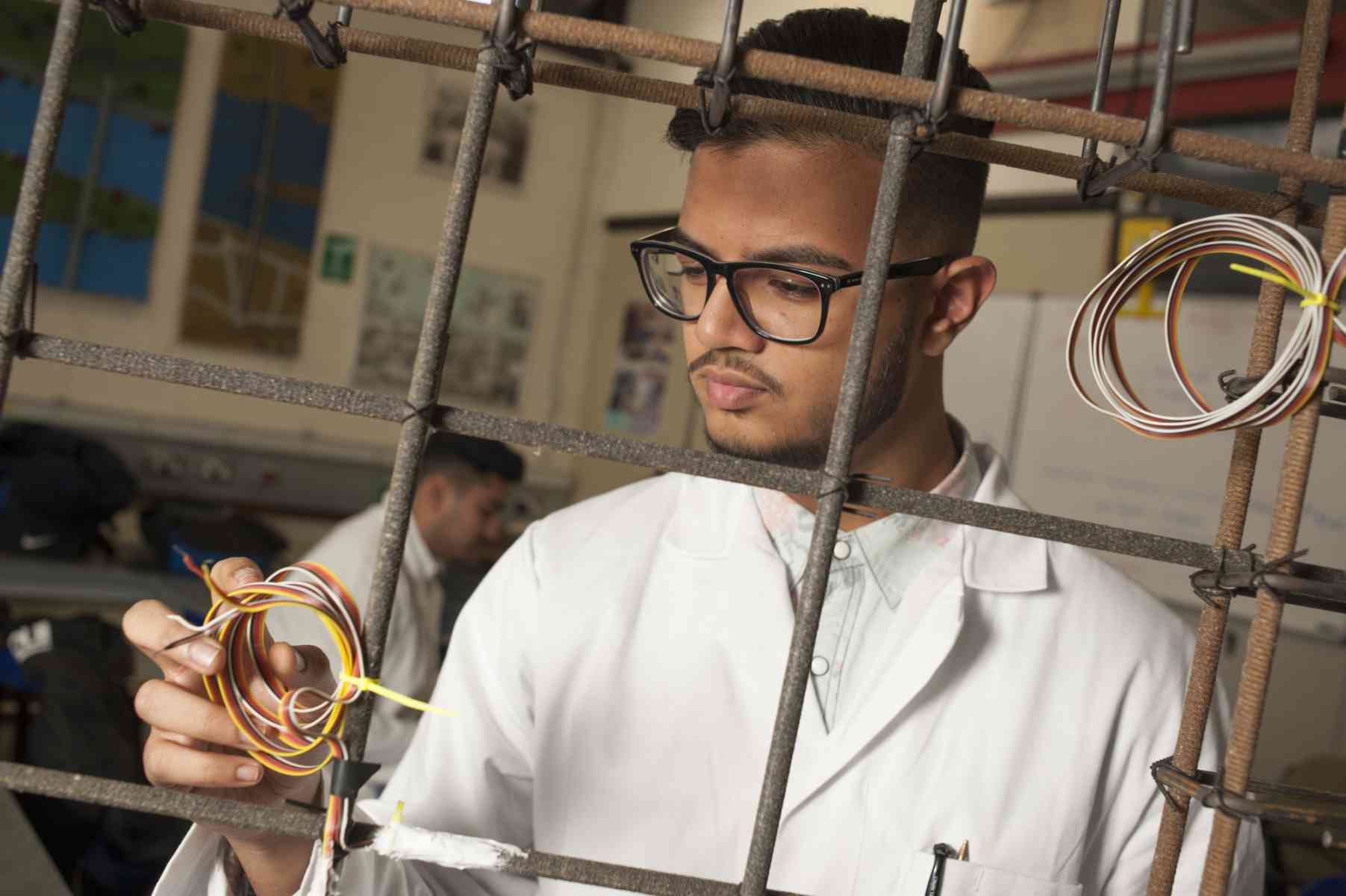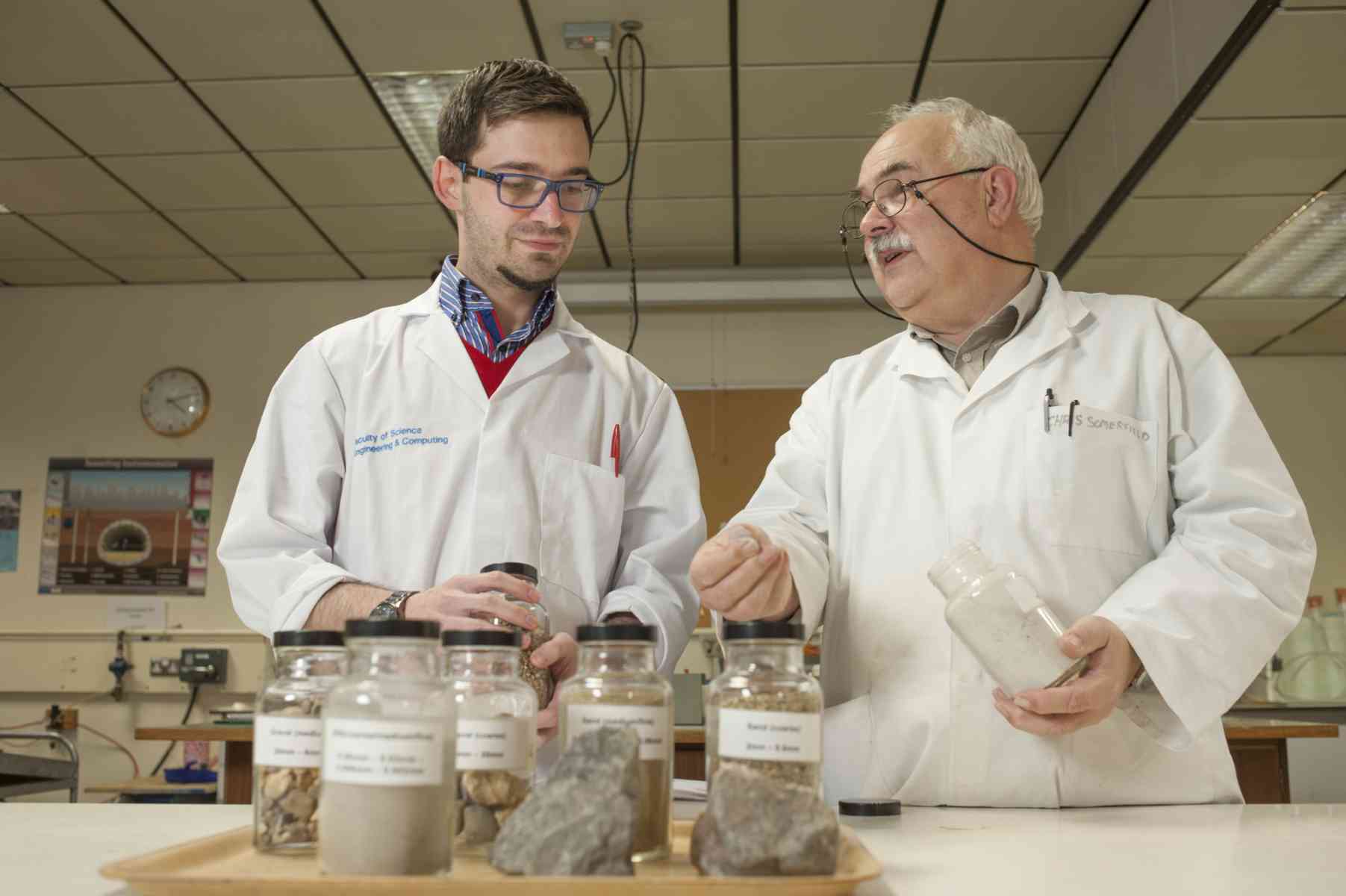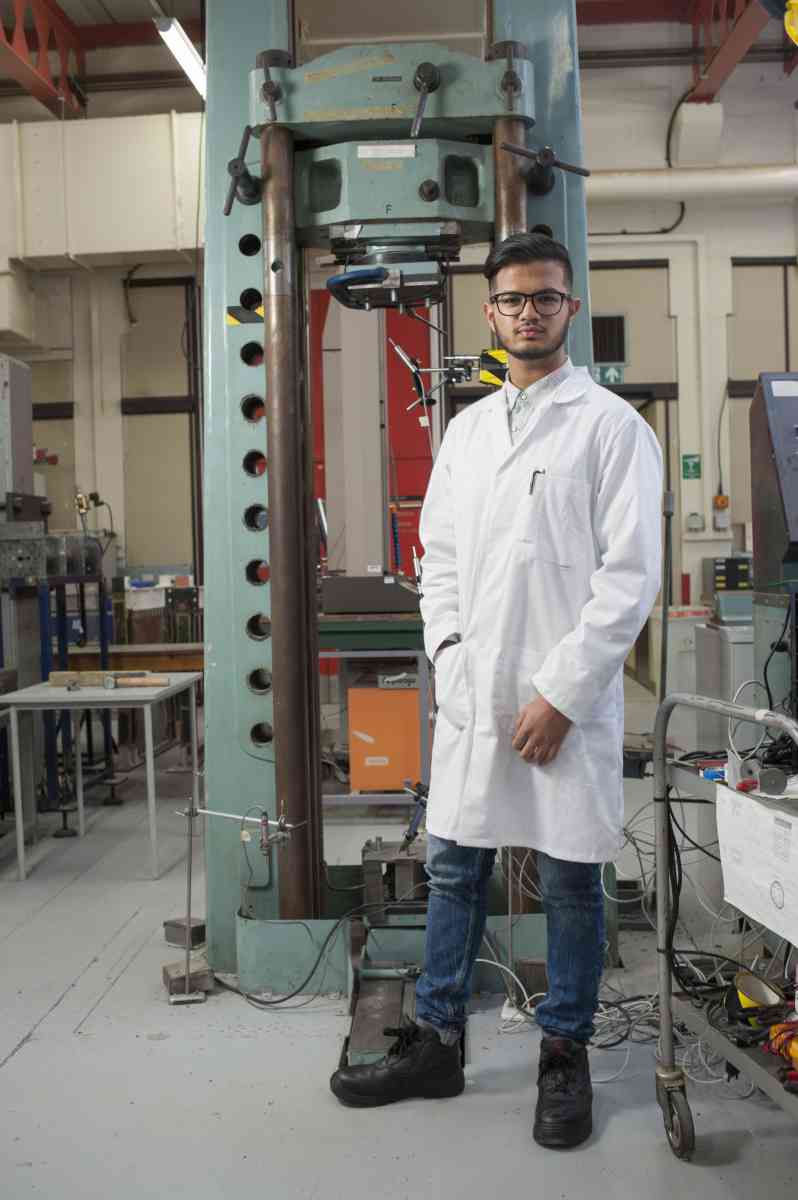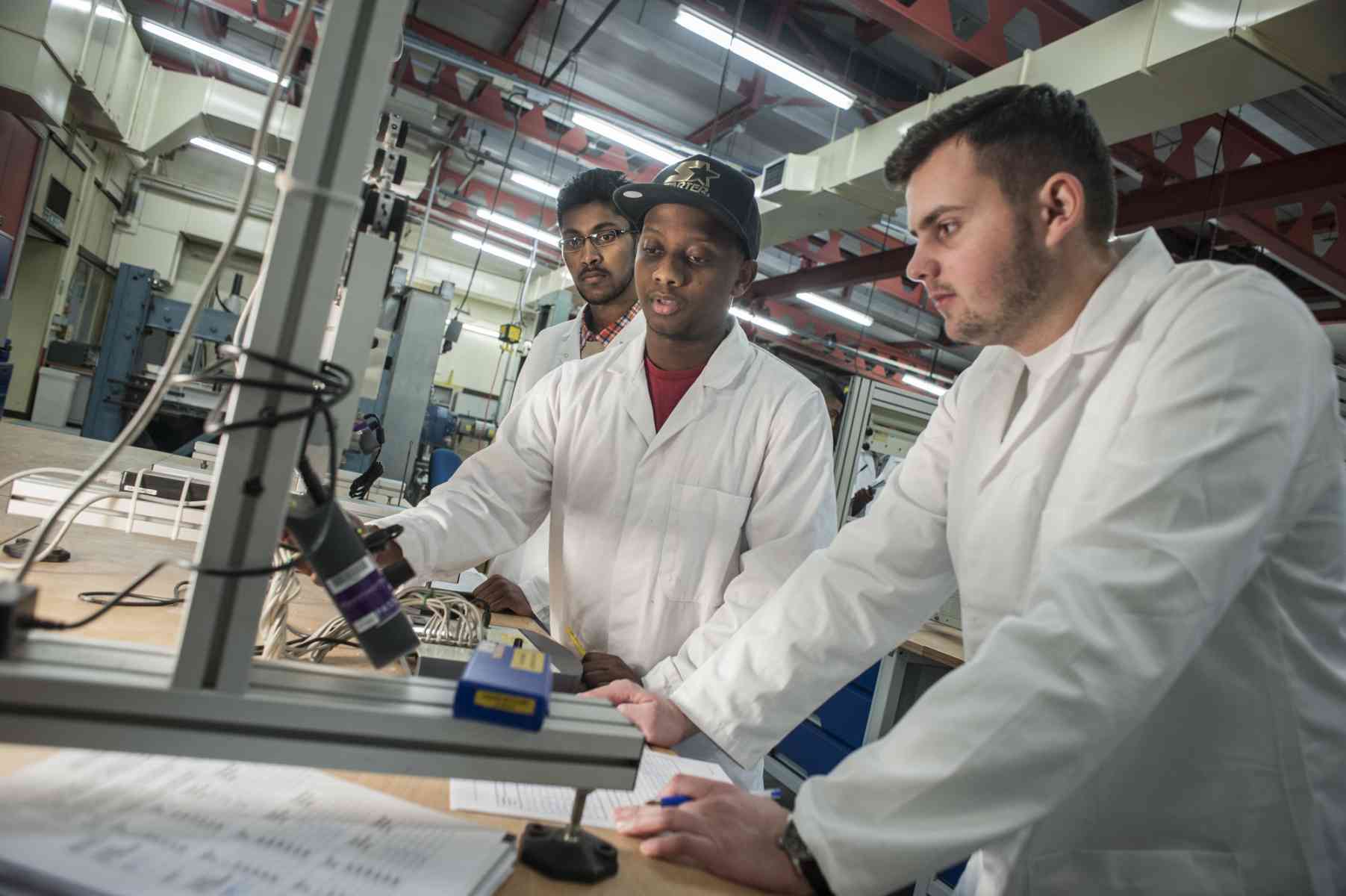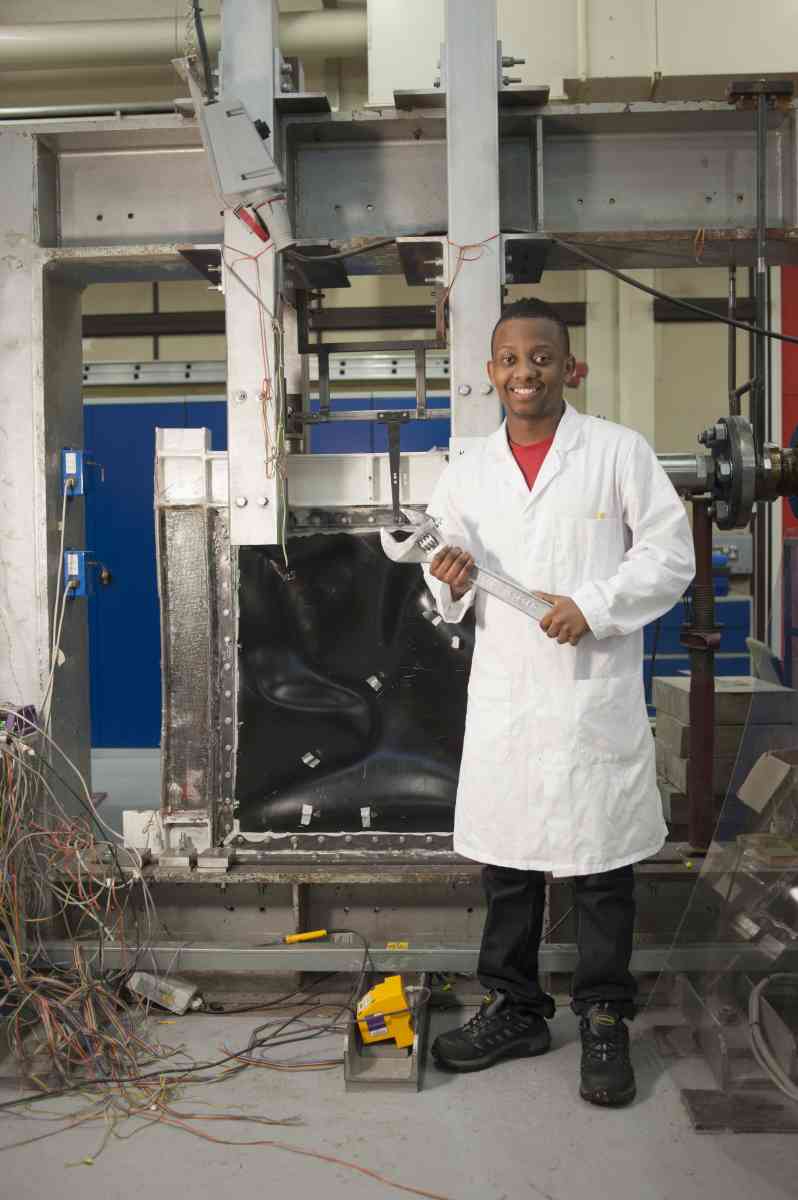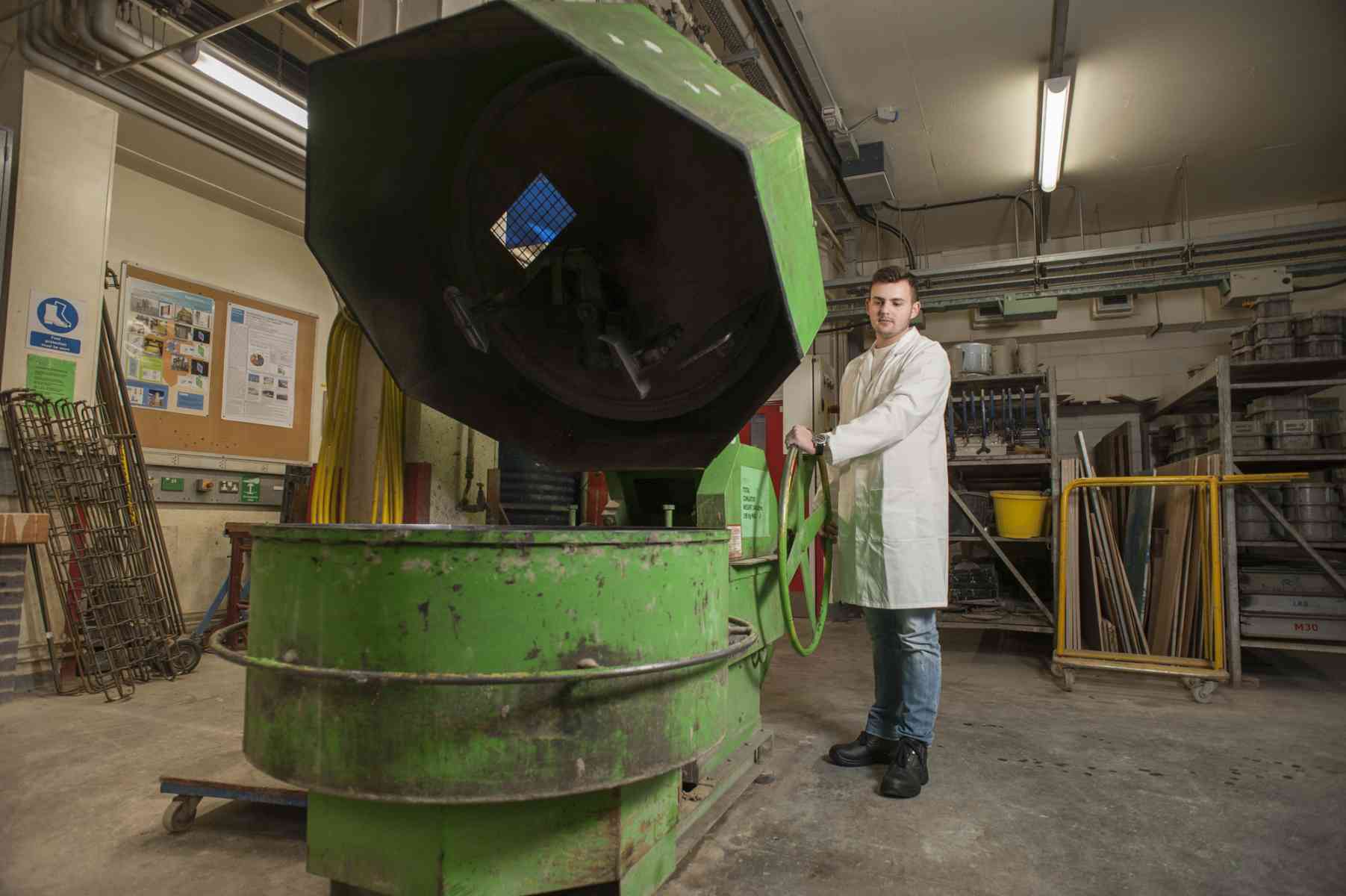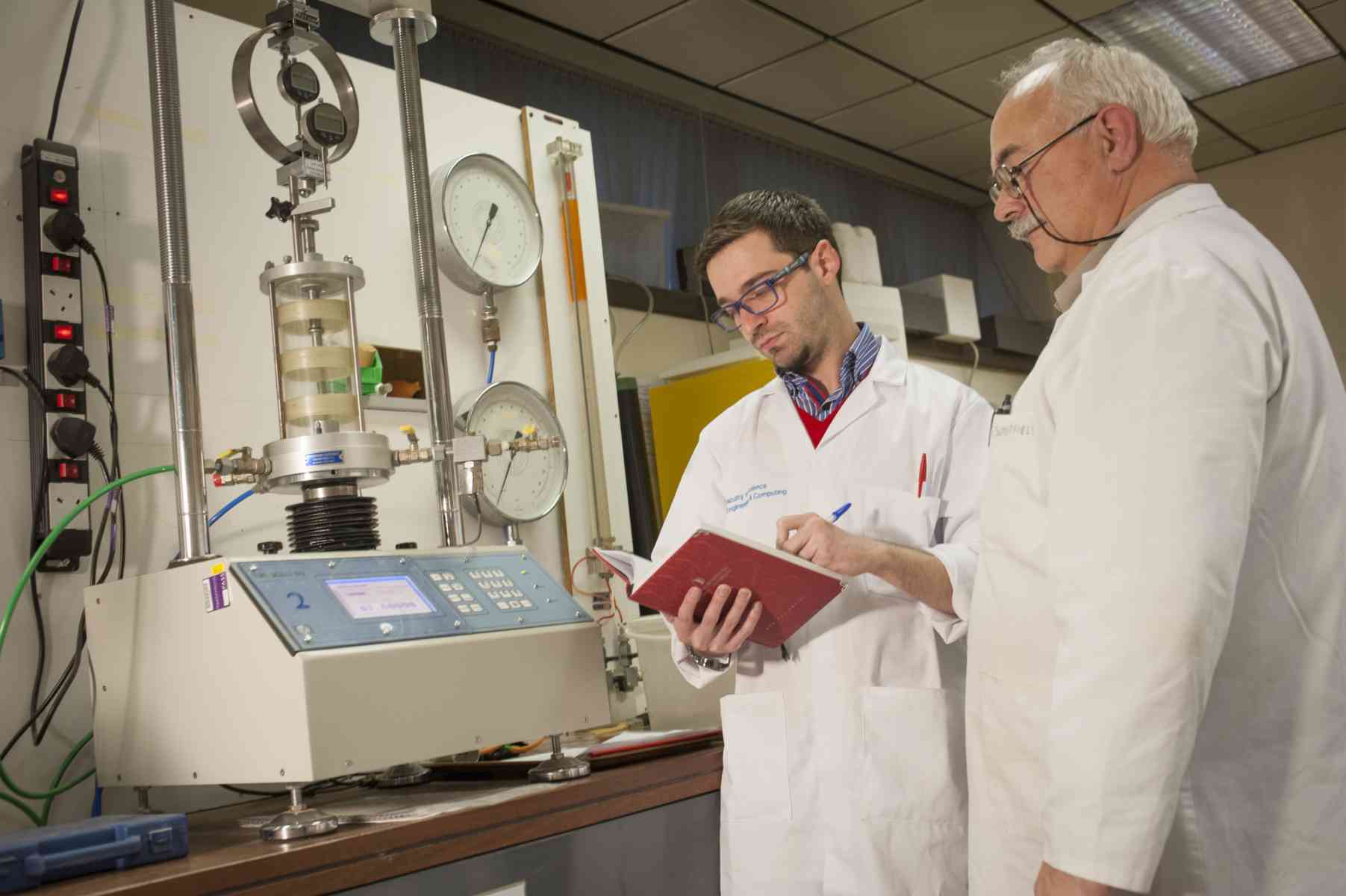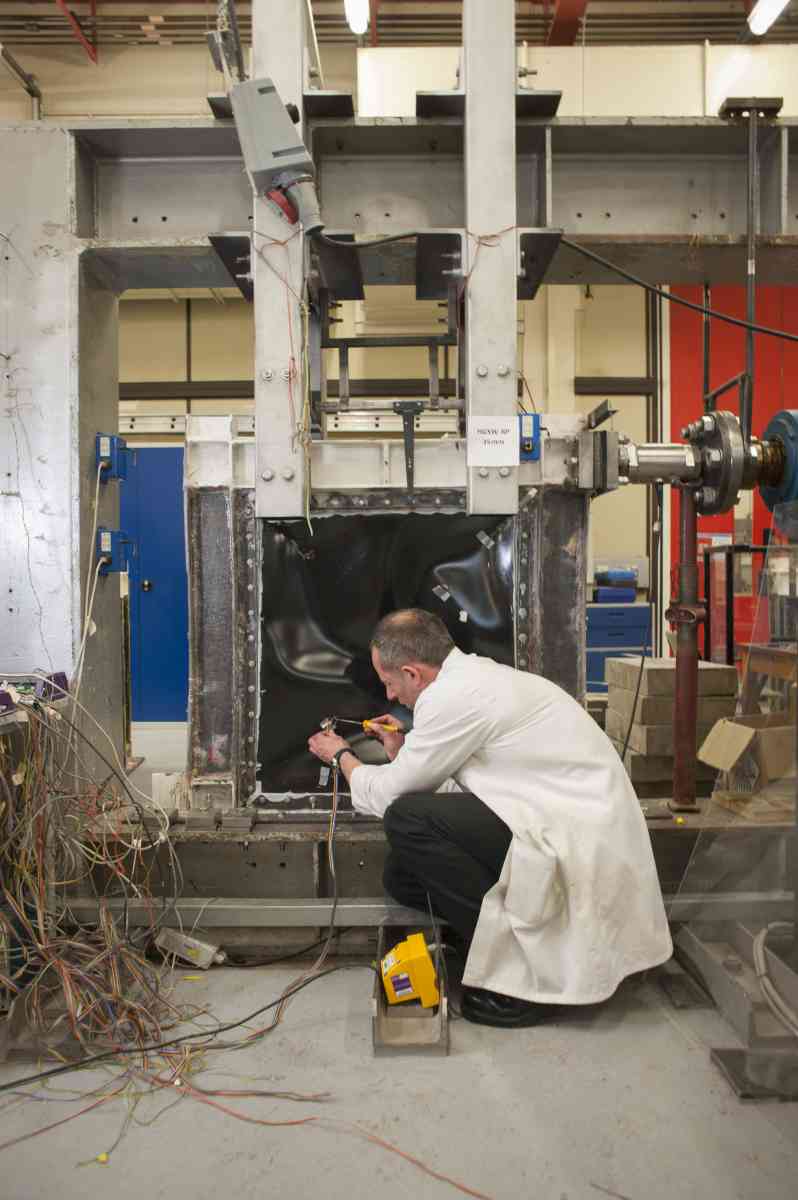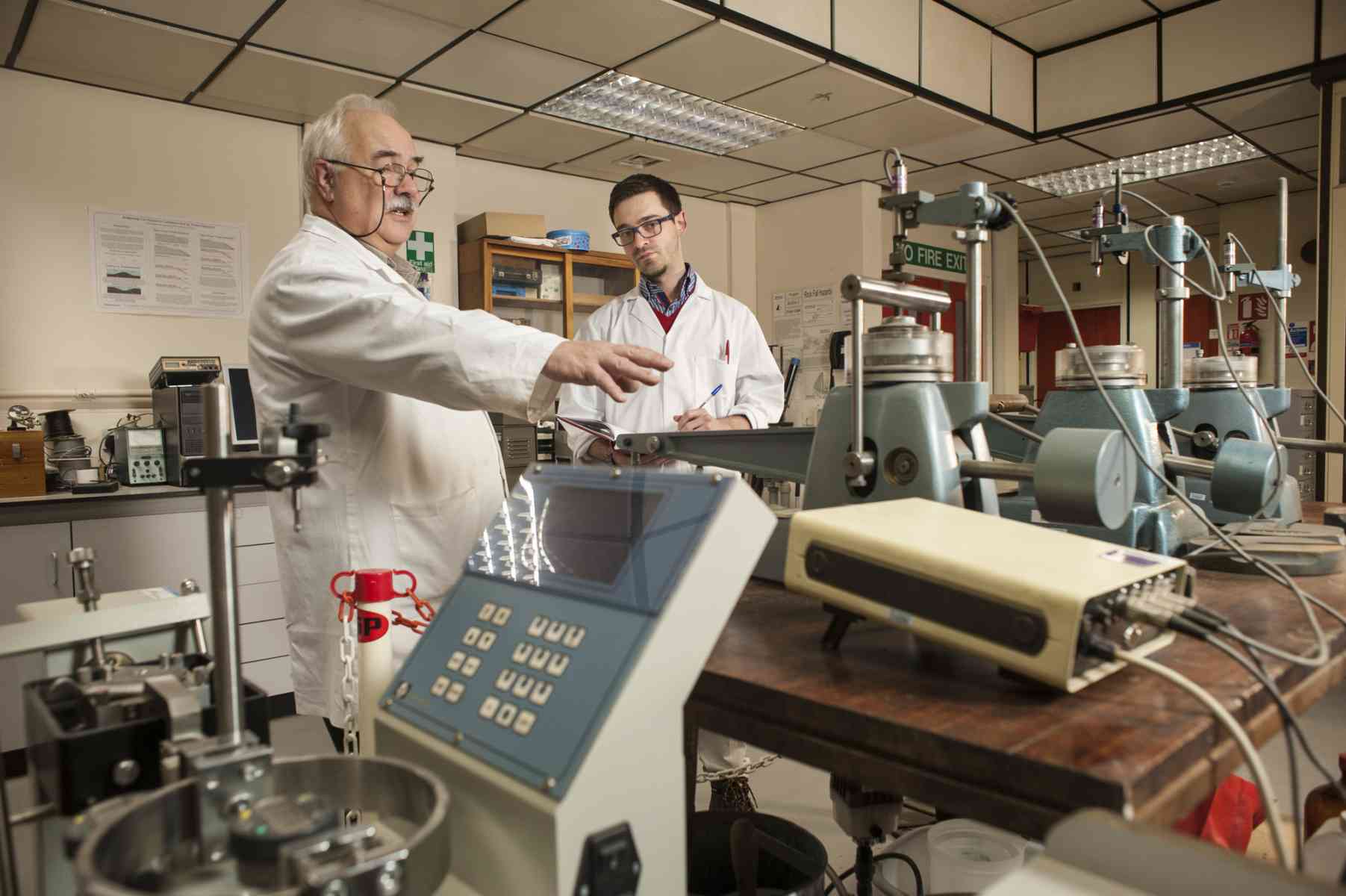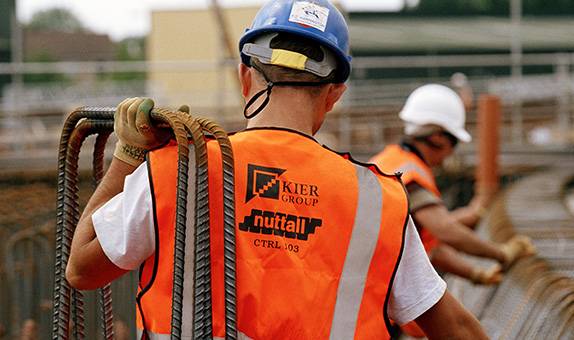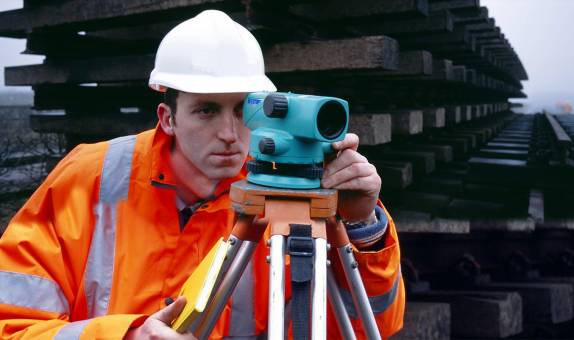Building Surveying BSc (Hons)

Teaching Excellence Framework (TEF) Gold award
Our commitment to high quality teaching has been recognised with a TEF Gold rating. The University has received an overall rating of Gold, as well as securing a Gold award in the framework's two new student experience and student outcomes categories.
Why choose this course?
On this course, you'll gain detailed knowledge of building maintenance, care, conservation and structure, reflecting the work of a building surveyor. You'll study the business and legal aspects of property and construction. You'll learn how to advise clients of legal and financial implications resulting from the condition of buildings.
You'll examine building designs, poor, good and/or sustainable. You'll use sketching and computer-aided design packages. You'll also examine reasons for constructions and buildings failing, which is a key knowledge base for chartered building surveyors. A major group project and an independent research project will give you the opportunity to showcase your learning.
| Qualification | Attendance | UCAS code/apply | Year of entry |
|---|---|---|---|
| BSc (Hons) | 3 years full time | K261 | 2024 (Clearing) 2025 |
| BSc (Hons) | 4 years full time including sandwich year | K230 | 2024 (Clearing) 2025 |
| BSc (Hons) | 5 years part time | Apply direct to the University | 2024 (Clearing) 2025 |
| Degree Apprenticeship | 5 years part time | Enquire via the KU Apprenticeship Team | 2024 (Clearing) 2025 |
Contact the KU Apprenticeship Team
Please note: Teaching on this course may take place on more than one KU campus.
| Main Location | Penrhyn Road |
Reasons to choose Kingston University
- The course is accredited by the Royal Institution of Chartered Surveyors (RICS) and the Chartered Institute of Building (CIOB).
- Kingston is actively involved in Assessment of Professional Competence (APC) and can help you in the process of qualifying as a chartered surveyor.
- You can choose a year's work placement. This will put invaluable experience on your CV and give your career a head start.
- Kingston University is ranked No.3 in London for Construction, Surveying and Planning (The Guardian University Guide 2024).
Professional accreditation
This course is accredited by the Royal Institution of Chartered Surveyors (RICS) and Chartered Institution of Building (CIOB). See the Royal Institution of Chartered Surveyors (RICS) website and Chartered Institution of Building (CIOB) website for further information.
Becoming a chartered surveyor
The most popular route is:
- complete a degree accredited by the RICS, such as this degree at Kingston University; and then
- successfully complete structured training, which ends in an assessment of your competence to practise (Assessment of Professional Competence [APC]).
We are actively involved in APC, including preparation courses, and several staff members are RICS assessors. This means that Kingston University can help you from the start of your undergraduate degree right through to your registration as a chartered surveyor.
What you will study
You'll study the business and legal aspects of the property and construction industries. You'll learn how to advise clients of legal and financial implications resulting from the condition of buildings. Sustainable building design is also key to this course.
You'll also develop and practise skills for your future career, including: presenting yourself; working in teams; writing reports; debating current topics; applying IT to your discipline; and initiating and executing research projects.
Year 1
Year 2
Year 3/4
Year 1 explores design. You'll examine what makes a building well or poorly designed. You'll use both sketching and computer-aided design packages. You'll study the design process, the relationship of buildings to the environment and the need for design innovation and sustainability.
In the first year, students will be introduced to Navigate (a Future Skills module which aimed to assist students in making the transition to Higher Education, develop strong foundations of self-awareness, self-motivation and generate a sense of belonging to their course and Kingston University), sustainability, climate literacy, the United Nations Sustainable Development Goals (UNSDGs).
Core modules
Navigate for Professional Engineers
15 credits
You will be introduced to your course learning aims and will consider your learning targets from now until graduation. You'll take ownership of your personal academic journey through the development and application of academic skills aligned to Kingston's Graduate Attributes and your discipline-specific professional body learning outcomes.
You'll be tutored in a range of 'learning to learn' techniques. You'll be introduced to assessment for learning and the roles of feedback, reflection and feedforward as integrated parts of your learning journey. This will be supported through active engagement in Kingston's Navigate Programme.
Introduction to Site Measurement
15 credits
This module introduces you to the principles of measurement of construction work. It focuses on the detailed quantification of simple buildings so you can gain an understating of industry rules and conventions for measuring construction work and their application. Upon completion, you should be able to competently measure the building envelope of simple residential buildings to address related issues. The module is taught by a series of lectures, tutorials and workshops in which you will be expected to take an active role.
People and Organisation Management
15 credits
This module explores insights into human resource management and organisational behaviour to develop the knowledge, understanding and skills relevant to managing employees and organisations in the built environment.
Insights from this module support your appreciation of socioeconomic and other cultural characteristics of construction organisations. These could include recruitment and selection, leadership, employee motivation, team dynamics, and organisational cultural shifts.
Introduction to Law and Regulatory Context
15 credits
This module give you an overview of the modern English legal system, with a specific focus on key legislative and regulatory frameworks. It covers essential aspects of contract law and introduces elements of tort law relevant to the construction industry.
Additionally, you will explore regulations and statutory acts that are applicable in the UK construction sector. You will learn to employ appropriate legal methodologies to address scenario-based legal problems.
Introduction to Construction Technology
30 credits
This is a core technology module where you will explore alternative construction materials and technologies used for low-rise built facilities. You will learn about the impact of construction methods and materials on important issues, including building regulations, health, safety and welfare regulations, sustainability and the environment.
By the end of the module, you should have developed a fundamental knowledge of building types, and be able to interpret drawings, produce sketches and appreciate the reasons for the selection and use of different construction materials and service solutions.
Principles of Surveying Practice in Context
30 credits
This module introduces you to the national and international construction industry. You'll learn about its structure, key stakeholders, and societal impact. The importance of the construction industry will be analysed along with contextual factors that regulate and influence its operation. The role of important players in the construction sector will also be examined.
You will be introduced to basic economic theory and its application to the industry as well as the fundamentals of the management of organisations. Professional ethics and rules of conduct and other closely related competencies will also be considered in this module.
The module will be delivered in a series of lectures and small group sessions including seminars, tutorials, and workshop sessions. You will be assessed through a mixture of coursework and exams.
Year 2 examines construction – how and why buildings fall apart. This is a key component of the knowledge base for chartered building surveyors. In the Building Maintenance and Management module you will learn how to keep buildings in use. Practical knowledge on pre/post-contract financial and contract administration as well as digitisation in construction (i.e. using REVIT and BIM related software), construction technology including its environmental services will be introduced.
Core modules
Digital Technologies and Construction Modelling
15 credits
The module provides an in-depth understanding of digital technologies and construction-related information modelling in the built environment context. You will learn how digital construction has revolutionised the construction industry and how Building Information Modelling (BIM) and its closely related digital technologies are used as tools for the realisation of the Construction Industry 4.0.
The course covers various aspects of digital design, construction, and operation and maintenance, including the knowledge and use of tools related to BIM, virtual reality, artificial intelligence, and geographic information system. You will learn about BIM software, collaboration techniques, and project delivery methods.
You will also develop digital skills and knowledge such as data management, quantification, project team collaboration and cost analysis.
Procurement and Contract Administration
15 credits
This module introduces you to procurement strategies for executing construction projects and the intricacies of contract administration. The course identifies the various procurement routes for different project circumstances. The module further extends your critical knowledge and understanding of the contract administration and financial management duties of the project manager.
Although there will be lectures, the teaching and learning emphasis will focus on developing your core knowledge and interpersonal skills using scenarios, workshops and a day field trip to an ongoing project in a major city in England. This will help increase your problem-solving competencies and communication skills development. The module will be assessed by coursework.
Construction Technology and Environmental Services
15 credits
This module provides insights into the construction of commercial and other buildings. The module will extend your knowledge and skills in construction technology and services, from the basic types of construction to framed and more complex commercial structures.
By the end of the module, you should have developed a critical knowledge of building types, be able to interpret drawings, produce sketches and appreciate the reasons for the selection and use of different construction materials and services solutions.
Exploring Engineering Project Management
15 credits
This module considers the principles and practices for the design and management of engineering projects. The nature of engineering project management is discussed in the context of constraints on quality, time, risk, and sustainability. The module broadens your knowledge of how organisations undertake and monitor projects.
Design and Specification
30 credits
This module helps you gain an understanding of material science properties and specification. You will be introduced to basics of building design and the development of the design process, from concept to tender documents.
In this module, you will develop proficiency in using a Building Information Modelling platform (Revit) to produce digital architectural 3D models as well as technical drawings for construction.
The module is taught by mix of lectures, computer labs and practical sessions and is typically assessed by a design project portfolio.
Legal and Regulatory Compliance
30 credits
This module provides you with a critical understanding of legal and regulatory compliance related to the built environment. You will study regulations relating to retrofit and maintenance decisions. You will develop knowledge of the strategic and practical aspects for effective and efficient management and maintenance of buildings.
On a broader level, the module will also consider how a building relates to its location, considering the social, economic and environmental consequences of retrofit solutions. You will also develop skills in building appraisal so you can evaluate a building's performance.
The module will cover the principles of setting up and managing maintenance and small improvements works, and monitoring and evaluating building performance from owner and occupier perspectives. It will consider legislative and financial considerations and the increasing importance of managing carbon and energy, as well as general aspects of property management related to works, health and safety, landlord and tenant relations, and all matters associated with the smooth running of properties.
The module is taught by lectures, tutorials, and workshops/seminars.
Final year students will be guided to interact with professional and learning communities beyond the University and reflect on these interactions through Applied (a Future Skills module) where students will demonstrate the ability to apply their developing professional skills competencies in their chosen area and prepare students for employment and entrepreneurship.
Year 3 has modules in Project Management, Inspection and Building Pathology along with a workshop and a study trip. It culminates in a major group project, along with an independent research project. You will have the opportunity to combine and present all your learning from the course.
Core modules
Applied Business Management
15 credits
You will demonstrate the ability to apply your professional skills in your chosen area, and gain a broad understanding of the business environment in which professional activities are undertaken. The module will develop the technical, management and interpersonal skills required to perform in a team environment, and prepare you for employment and entrepreneurship.
You will participate in Kingston University's Bright Ideas competition where you will work as a team to develop a business idea. To do this you will need to interact with relevant stakeholders outside the University.
You will be guided to interact with professional and learning communities beyond the University and reflect on these interactions. This may include participation in co-curricular events such as subject-specific and career development events, and networking opportunities offered by subject-specific professional bodies. You'll leverage interactions with professionals in the development of your final year research project, and reflect on the co-benefits of these interactions.
Project Management
15 credits
This module introduces you to project management processes and tools and provides an overview of the project manager's role and function at different stages of the project life cycle.
Standards of professional and ethical conduct will be explored. You'll consider the appraisal of options leading to the developing of a business case and feasibility report as well as pre-construction planning and site establishment.
You will attend a series of lectures and practical sessions and are expected to take an active role by applying your knowledge to practical scenarios. The module is assessed by a client report.
Construction Information Management Systems
15 credits
The module provides an in-depth understanding of Building Information Modelling (BIM) and Construction Information Management System (CIMS) in the construction industry. It covers various topics related to BIM and CIMS, including their application, benefits, challenges, and future developments.
The module will begin by recapping the fundamental concepts of BIM and CIMS, including the evolution of BIM and its importance in the construction industry. It will then delve into the different stages of BIM and CIMS, including modelling, collaboration, documentation, and analysis. The module will cover various software tools that are commonly used in BIM and CIMS, such as Autodesk Revit, Navisworks, and BIM 360.
This module aims to enable you to apply and evaluate the key principles of BIM. You will undertake a collaborative interdisciplinary project to apply and develop your skills in a scenario-based group project.
Finally, the course will discuss the future trends and developments in BIM and CIMS, such as the use of Artificial Intelligence (AI), Machine Learning (ML), and Virtual Reality (VR) in construction.
Construction Law and Contract Practice
15 credits
This module aims to provide you with a comprehensive understanding of the legal aspects related to construction projects. It is designed to equip you with the knowledge and skills necessary to navigate the legal framework governing the construction industry, particularly in contract administration and management.
This module enhances your analytical and critical thinking abilities when confronted with legal and professional practice challenges. It promotes a holistic comprehension of sustainability in the context of the built environment and provides an in-depth examination of construction disputes and the commonly employed methods of dispute resolution.
You will acquire practical techniques for effective time management, develop proficiency in locating, interpreting, utilising and referencing legal sources, and cultivate essential attributes valued by the construction industry, including collaboration, team building, critical and analytical thinking, problem-solving, effective communication, initiative and creativity.
Inspection and Building Pathology
30 credits
This module provides you with a critical understanding of inspection and building pathology. You will study the legislative and regulatory bodies for building control and explore the current applications to survey, evaluate and diagnose different building pathologies.
You will also study different building materials in order to provide professional advice regarding building defects, considering environmental, legislative and societal factors.
The module is taught through lectures, seminars, workshop discussions and site visits, and is assessed through coursework which may include a report and exhibition and an open book examination.
Individual Project
30 credits
The individual project is an opportunity to explore a subject of your own choice. You will initiate, design and execute a small-scale research project under supervision. Your project will draw upon material from all modules previously or currently taught and provide a culmination to your degree. This allows you to develop and practice your research skills that will be invaluable for the future.
You will work independently, studying a topic in depth, reviewing previous work, and collecting, interpreting and analysing information. This is also intended to develop your ability to communicate clearly and succinctly orally, graphically and in writing. In undertaking the work, you should demonstrate knowledge and competence in reviewing literature and in using one or more of a range of research methods to collect and analyse data and draw well-founded conclusions.
To support you, a series of workshops will be given along with individual one-to-one supervision. Assessment is by submission of an initial formative research statement and summative assessments comprising an interim report and the completed project.
What our students say
Links with business and industry
Our links with industry and professional bodies mean that your course reflects up-to-the-minute developments.
We make sure that you gain real experience of working for professional clients. Most surveying students undertake a year's work placement in industry, which contributes towards your professional training period.
Placement destinations have included:
- DTZ;
- Savills;
- Franklin and Andrews;
- Grosvenor Plc;
- Jones Lang LaSalle;
- Knight Frank;
- London Borough of Wandsworth;
- Montagu Evans;
- WS Atkins; and
- Lambert Smith Hampton.
You can also gain professional-style experience within the academic curriculum. You might take part in mock hearings and workshops, for example. In the second year you have the chance to go on an overseas residential field trip where you work on a real project. Previous destinations have included Amsterdam, Barcelona and Dublin.
Other examples of our links with industry include:
- a pan-European business challenge - this competition for final-year real estate students involves working with peers from several different EU countries and travelling to places such as Warsaw, Bratislava, Frankfurt, Amsterdam and Groningen.
- private views of new developments in the City of London for first-year students - this is thanks to property management company CBRE. Executives from the company have also talked to students on issues such as letting, rents and services.
Centre for Excellence in Teaching and Learning (CETL)
The award of CETL status has enabled us to develop a Centre for Sustainable Communities Achieved through Integrated Professional Education. You benefit from:
- brilliant facilities, including a specialist learning resources centre and a debating chamber;
- a developing alumni network, leading to improved placement and graduate career opportunities;
- exciting opportunities for real projects and consultancy work;
- links with other schools in the University, giving you an understanding of the role built environment professionals can play in developing sustainable communities; and
- teaching informed by the latest research on sustainability.
Future Skills
Knowledge to give you the edge
Embedded within every course curriculum and throughout the whole Kingston experience, Future Skills will play a role in shaping you to become a future-proof graduate, providing you with the skills most valued by employers such as problem-solving, digital competency, and adaptability.
As you progress through your degree, you'll learn to navigate, explore and apply these graduate skills, learning to demonstrate and articulate to employers how future skills give you the edge.
At Kingston University, we're not just keeping up with change, we're creating it.

Degree apprenticeships
The Building Surveying (Hons) Degree Apprenticeship programme provides a strong platform for pursuing and achieving a varied and interesting career in Building Surveying and incorporates recent developments in industry and education as well as the curriculum and teaching principles from research and academic.
Typically, you'll spend one day a week at university rather than your place of employment. There will also be learning activities and training at your workplace.
Entry requirements
If you would like to join us through Clearing 2024, please call our Clearing line on 0800 0483 334 (or +44 020 8328 1149 if you are calling from outside the UK) and speak to our friendly and knowledgeable hotliners who will be able to provide information on available courses and will guide you through your options.
Please note the entry requirements listed below are for 2025 entry only.
Teaching and assessment
Scheduled learning and teaching on this course includes timetabled activities including lectures, seminars and small group tutorials.
It may also include placements, project work, workshops, workshops in computer labs, and laboratory workshops.
Becoming a chartered surveyor
To qualify as a chartered surveyor, you must:
- gain a RICS-approved academic qualification, such as a degree from Kingston University; and
- successfully complete structured training, which ends in an assessment of your competence to practice (APC).
We are actively involved in APC, including preparation courses, and several staff members are RICS assessors. This means that Kingston University can help you from the start of your undergraduate degree right through to your registration as a chartered surveyor.
RICS is the leading source of land, property, construction and related environmental knowledge. The organisation:
- supports 120,000 members worldwide;
- promotes best practice;
- represents consumers' interests; and
- provides impartial advice to society, businesses, governments and global organisations.
Who teaches this course?
The course is taught by the Department of Civil Engineering, Construction and Surveying. Staff have a wide range of experience across research and industry and continue to practise and research at the cutting edge of their discipline.
Our programmes have been designed with your aspirations, needs and abilities in mind, and are aimed at developing your specialist skills, deepening your understanding and offering new insights and perspectives to equip you for a professional career ahead.
Academic staff in the department are bonded in an interdisciplinary team of civil and structural engineers, material scientists, geologists, hydrologists, construction managers, building and quantity surveyors with professional practice and applied research backgrounds. Many of us are nationally and internationally recognised leaders in our areas of specialism and we are frequently invited to undertake high-profile external research and consultancy work.
Having developed our courses with the working world in mind, we offer hands-on student experiences such as testing in our exemplary laboratory facilities in structures, materials, concrete, geotechnics and hydraulics that are used for teaching and research. Knowledge is also gained from field trips for both undergraduates and postgraduates; site visits and industrial placements; employability support via our strong partnerships with industry, professional institutions and learned societies.
Our teaching is engaging and practice-focused and supported by site visits and invited guest lecturers by our industrial liaisons and strong alumni network. Our approach to assessment is project-driven and seeks to equip students with a range of competencies and transferrable skills thus boosting their employability prospects.
Postgraduate students may run or assist in lab sessions and may also contribute to the teaching of seminars under the supervision of the module leader.
Facilities
The campus has grown around the original four-storey main building, which houses many of the important hubs of activity like the main student restaurant, the learning resources centre (LRC), and a host of teaching rooms and lecture theatres.
At the heart of the campus is the John Galsworthy building, a £20million teaching and learning facility. The six-storey complex brings together lecture theatres, flexible teaching space and information technology suites around a landscaped courtyard.
The £9.8million Eadweard Muybridge building also provides spacious specialist laboratories and teaching spaces.
Find out more about the Penrhyn Road campus in the virtual tour.
Library
The Penrhyn Road Library gives you access to a large collection of printed and electronic resources. There are drop-in PC areas, video and DVD facilities, satellite TV and a variety of study spaces zoned for different types of learning activity. The wireless network in the library means you can also work from your laptop or mobile device.
There's also a reading garden, which offers an oasis of calm when you want to get away from it all, plus a Learning Cafe where you can study over a cup of coffee and a snack. Help and information is on hand for students with disabilities or special learning needs.
Course fees and funding
Additional costs
Depending on the programme of study, there may be extra costs that are not covered by tuition fees which students will need to consider when planning their studies. Tuition fees cover the cost of your teaching, assessment and operating University facilities such as the library, access to shared IT equipment and other support services. Accommodation and living costs are not included in our fees.
Where a course has additional expenses, we make every effort to highlight them. These may include optional field trips, materials (e.g. art, design, engineering), security checks such as DBS, uniforms, specialist clothing or professional memberships.
After you graduate
You'll graduate ready to begin your career in building surveying – a varied and challenging profession with good starting salaries and opportunities for progression and travel.
Key information set
The scrolling banner(s) below display some key factual data about this course (including different course combinations or delivery modes of this course where relevant).
Course changes and regulations
The information on this page reflects the currently intended course structure and module details. To improve your student experience and the quality of your degree, we may review and change the material information of this course. Course changes explained.
Programme Specifications for the course are published ahead of each academic year.
Regulations governing this course can be found on our website.












